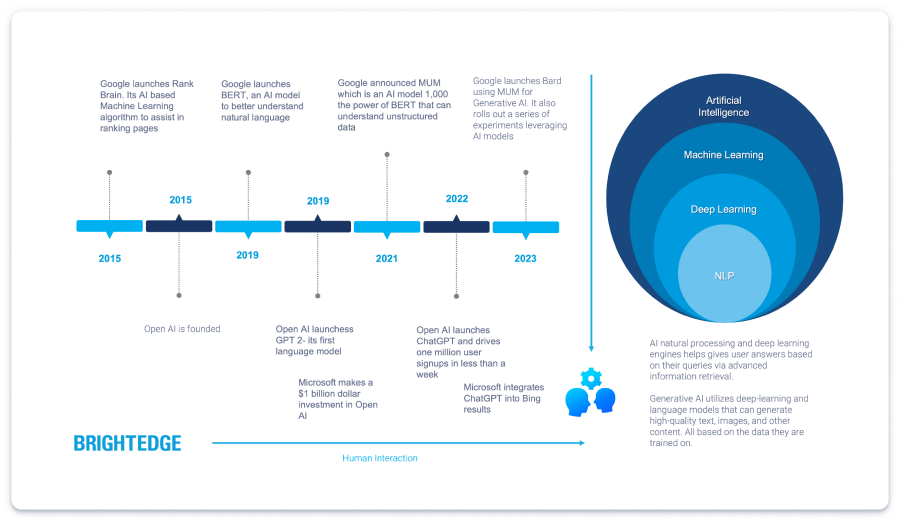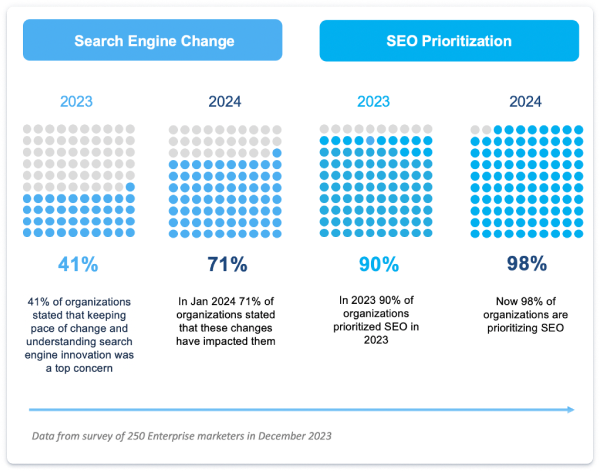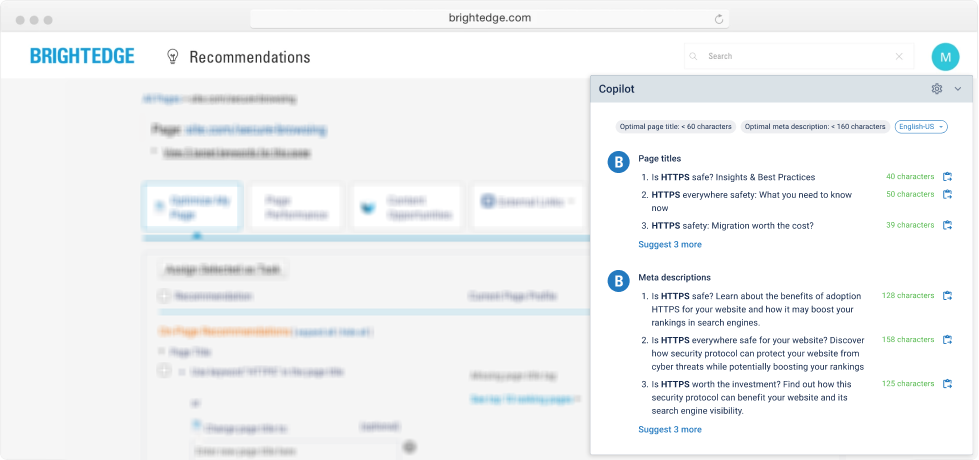Over the past year, it’s become apparent Generative AI has the potential to transform entire industries. This could not be more true for enterprise SEO. On one side, search engines are making significant updates to their results. They are no longer just links and content copied from websites. Now they can generate entire answers with full paragraphs, ordered lists and conversational elements all generated by large language models. On the other side, AI is allowing marketers to become more productive and increase the quality of their outputs. These two forces together have the potential to reshape how SEO is done. In this post, I want to cover how this is taking place and how enterprise organizations are preparing.
Decoding the Influence of AI on Enterprise SEO
Artificial Intelligence is significantly reshaping SEO by changing the way search algorithms operate and how they tailor results for individual queries. Notably, in the past year, the adoption of ChatGPT by Bing and the introduction of Google’s Generative Search Experiences (SGE) have highlighted AI’s pivotal role in the future presentation of organic search results.

Large enterprise SEOs rely on organic search traffic. They are responding by adjusting their strategies and increasing their investments to stay competitive. Each year, we consult with our top enterprise customers to get their feedback on the year’s performance and its impact on their business. This year, they’ve expressed a clear consensus: the status quo is not sufficient.

The year 2022 was pivotal for SEO due to significant updates and changes. The implementation of the Helpful Content update was in full swing, several review updates rolled out, and we observed notable shifts in search results due to various core updates.
However, 2023 was even more transformative, with approximately 71% of survey respondents acknowledging that these changes had a considerable impact on them. They were adapting to AI-driven search results, new review policies, and competitive pressures from changes in media budgets.
High-performing enterprise SEO teams are expected to make SEO a priority, and as we approached 2023, this was indeed the case. But by December, when we revisited this topic with our clients, almost all of them confirmed that SEO had become an organizational imperative.
For those involved in enterprise SEO, these developments are both thrilling and challenging. The question now is: how are their approaches changing to reflect this heightened focus on SEO?
Optimizing Enterprise SEO with Data on Demand
Despite the growing complexity of SEO, strategies and tactics must remain clear and focused on results. SEO teams, facing increased scrutiny, should rapidly distinguish between impactful patterns and short-term trends. In an evolving AI-driven landscape, their approaches need to be both effective and flexible.
Consequently, enterprises must move beyond relying on general best practices or conjecture to understand metric changes. Their solutions need to be precise, actionable and tailored to their specific requirements. With Google’s Search Generative Experiences and ChatGPT’s integration in Bing search, fundamental aspects of SEO are becoming more prominent. Understanding the interplay between these developments and preparing for future challenges is essential. SEO teams require reliable data to accurately identify their primary areas of focus.
For example, our CTO, Lemuel Park, recently highlighted that top-ranking web pages have increased in speed over the last few years. For large organizations, this information is useful, but they must delve deeper to determine how this trend specifically affects them.
They need to understand the details:
- Are faster page speeds more crucial when customers are about to make a purchase, or just when they are gathering information about a product or service?
- What specific factors contribute to making a website slower or faster, thereby affecting its preference in organic search results?
To uncover these insights, enterprise SEO teams must sift through extensive data to identify the causes of decreases or surges in performance.
Recognizing this need, we at BrightEdge ensured that our SearchIQ technology was available to all customers at last year’s user conference, SHARE23, to provide access to this vital information. LlLarge-scale SEO teams must now, more than ever, base every action on solid data. This approach is necessary to withstand internal scrutiny and validate their strategies when they achieve success.
Simultaneously Reducing Manual Work and Scaling Up
As AI transforms the search landscape, enterprise SEO teams are integrating AI into their operations to enhance productivity. By linking tactics and strategies to specific data points, they not only scale up their output but also save time. This extra time is then used for making strategic decisions and acting on insights gathered from their data.
A prime advantage of AI in content creation is that the AI can improve productivity and help content writers get past writer’s block. For example, AI can quickly brainstorm lots of ideas for an author and suggest topics and themes that may take a writer significant and tedious time to do. At the same time, AI can eliminate human errors and ensure consistency in the final product.
Through our own evaluations, we’ve observed a surge in AI-enhanced content within search results. We scan the pages ranking in the top 10 results to see if there’s any indication on the page that the content was created with the assistance of AI (usually this is a disclaimer the author or the website makes at the bottom of the page). We then apply a click curve based on the position and search volume for the keyword that piece of content is ranking for. When we aggregate and measure the presence of pages like this over time, we see a significant trend:

These pages are not hiding the fact that some AI was involved in their content’s creation. Google clarified its position on AI supported content, suggesting that as long as the content is unique and adheres to their E-E-A-T principles, the content will be shown in organic results. Our data suggests this is true and content creators are indeed getting traction creating content in this manner.
The influence of AI on the quality of search results has been a hot topic. Google has stated that content should be original and crafted for users, not just search engines. Enterprise SEO teams are taking heed of this advice by developing long-term strategies.
Rather than solely depending on basic AI content creation tools or completely automating content production, they are integrating AI into their existing workflows. This integration accelerates time-to-publishing, while allowing strategic thinking and creativity to flourish.
Applications like BrightEdge Copilot are being used by enterprise teams to assist with generating titles, descriptions, content briefs, and initial drafts. These technologies help overcome creative blocks and streamline customer interactions. Importantly, such AI applications don’t replace human team members; they enhance their efficiency.

As nearly all enterprise SEO teams we’ve spoken with are placing a higher priority on SEO this year, there’s a pressing need to maximize efficiency. They’re turning to technologies that can scale up their current processes quickly, while preserving the essential editorial and creative tasks that distinguish their brands in the market.
With Google’s shift to continuous spam updates last year, we expect a persistent focus on filtering out low-quality content. This ongoing process, rather than sporadic updates, should favor the production of high-quality content as the rollout progresses.
Navigating the Potential Pitfalls of AI in Enterprise SEO
AI technology is streamlining workflows in enterprise organizations, reducing manual efforts required for expansion. However, it’s crucial to recognize the drawbacks of overdependence on AI. While AI enhances efficiency and precision in SEO tasks, it has limitations. A significant issue is “AI hallucinations,” where AI models produce incorrect or misleading information. This risk, inherent in current large language models, cannot be completely eliminated.
Additionally, the success of generative AI heavily relies on the quality of the input. AI-generated content might not match the desired brand tone and style without specific guidelines. Furthermore, there’s a risk associated with the content’s nature. For example, AI could inadvertently discuss negative aspects of a product or topics that pose potential liabilities. These issues underscore the importance of vigilant oversight and strategic input in using generative AI for content creation.
Teams focused on enterprise SEO, aiming for sustained success, recognize these boundaries and are proactively finding ways to improve teamwork.
As SEO becomes more of a priority and the extraction of actionable insights from data becomes crucial, it’s important for these insights to be accessible across the organization. AI helps in this aspect as well, particularly in areas where BrightEdge Insights, is enabling team members to quickly understand the key information and identify their main action items.
We’re observing a trend where enterprise teams are granting access to our platform to a wider range of non-SEO staff. The AI-enhanced Insights simplify complex metrics into clear and comprehensible information, cutting down on the time needed for analysis and ensuring the right individuals are informed and ready to act.
The Future of Enterprise SEO and AI’s Role in Innovation
AI-driven technologies are adding efficiency to tasks that were once laboriously manual, like keyword research, content optimization, and monitoring performance. These advanced tools use machine learning to sift through vast data sets, providing SEO professionals with valuable insights for strategic planning.
As AI technology advances, it’s altering the traditional role of SEO experts.
With AI helping on managing routine and data-heavy tasks, SEO practitioners can now direct their attention to strategic planning and creative initiatives. By leveraging AI, they can interpret complex data and use these insights to create more impactful SEO strategies.
Envisioning how AI can affect SEO helps us grasp its potential influence on the industry’s future. AI is set to greatly improve search engine algorithms, resulting in more accurate and personalized search results. Additionally, it offers the potential for SEO teams to increase their productivity and enhance the quality of their work.
Embracing AI for SEO Success: Insights from BrightEdge
At BrightEdge, we are at the forefront of the AI and enterprise SEO revolution, leveraging the capabilities of AI to redefine how businesses optimize for search engines.
We now have over 2000 marketers using our Enterprise SEO AI technologies.
For enterprise SEO teams who must juggle multiple responsibilities, AI is a game-changer in minimizing the grunt work that goes into achieving results. It streamlines the process from gathering insights to taking action. At the heart of this process are the SEO and digital marketing professionals who are carving out new strategies and pioneering novel methods to extract more value from organic search channels. We are enthusiastic about the innovations 2024 will bring and are committed to working together to make this year our most innovative yet!
- SEO Powered Content & PR Distribution. Get Amplified Today.
- PlatoData.Network Vertical Generative Ai. Empower Yourself. Access Here.
- PlatoAiStream. Web3 Intelligence. Knowledge Amplified. Access Here.
- PlatoESG. Carbon, CleanTech, Energy, Environment, Solar, Waste Management. Access Here.
- PlatoHealth. Biotech and Clinical Trials Intelligence. Access Here.
- Source: https://www.brightedge.com/blog/how-ai-transforming-enterprise-seo



